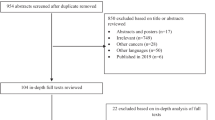Abstract
This study was conducted to explore the concerns and coping mechanisms used by patients with head and neck cancer and assess their quality of life. A group of 50 consecutive patients with oral and laryngeal cancers were interviewed using a coping and concerns checklist and a semistructured interview proforma to elicit the common concerns in relation to head and neck cancers and their surgical treatment. The Hospital Anxiety and Depression Scale was used to detect anxiety and depression. Concerns were compared between oral and laryngeal cancers and between preoperative and postoperative patients. Commonest concerns were about the future (64%), subjective physical evaluation (60%), finances (56%), being upset (54%), communication (54%), current illness (52%) and inability to do things (50%). The commonest coping mechanisms used were helplessness and fatalism. Resolution was noted in less than 40% of the frequent concerns. As compared to laryngeal cancer patients, those with oral cancer significantly more often had concerns about current illness, subjective evaluation of health, eating and chewing, social interactions, pain and disfigurement (P<0.05). Most subjects had numerous unresolved concerns. Mainly ineffective coping mechanisms such as helplessness and fatalism were employed leading to incomplete resolution. Interventions to minimise these concerns and to handle associated anxiety and depression would improve their quality of life.
Similar content being viewed by others
References
American Psychiatric Association (1980) Diagnostic and statistical manual of mental disorders, 3rd edn. American Psychiatric Association, Washington DC
Baile WF, Gilbertini M, Scott L, Endicott J (1992) Depression and tumor stage in cancer of head and neck. Psycho-Oncology 1:15–24
Chaturvedi SK (1991) What's important for quality of life for Indians in relation to cancer? Soc Sci Med 33:91–94
Chaturvedi SK, Shenoy A, Prasad KMR, Senthilnathan SM, Premalatha BS (1994) Quality of life in oral cancer patients. In: Varma AK (ed) Oral oncology IIIB: Therapy. MacMillan, Delhi, pp 528–531
Chaturvedi SK, Chandra P, Channabasavanna SM (1994) Detection of anxiety and depression in cancer patients. NIMHANS J 12:141–144
David JD, Barrit JA (1982) Psychosocial implication of surgery for head and neck cancer. Clin Plast Surg 9:327–336
Davies ADM, Davies C, Delpo MC (1986) Depression and anxiety in patients undergoing diagnostic evaluations of head and neck cancer. Br J Psychiatry 149:491–493
Devins GM, Stam HJ, Koopmans JP (1994) Psychosocial impact of laryngectomy mediated by perceived stigma and illness intrusiveness. Can J Psychiatry 39:608–616
Devlen JL (1984) Psychological and social aspects of Hodgkin's and non Hodgkin's lymphomas. University of Manchester, Manchester
Faberow NL, Ganzla S, Cutter N, Reynords D (1971) An eight year survey of hospital suicides. Life Threat Behav 1:184–201
Greer S, Morris T, Pettingale KW (1979) Psychological responses to breast cancer: effect on outcome. Lancet II:785–787
Harrison JA (1994) Predictors of psychiatric morbidity in cancer patients: the role of concerns and confiding. MD thesis, University of Manchester
Harrison JA, Maguire P (1995) Influence of age on psychological adjustment to cancer. Psycho-Oncology 4:33–38
Harrison JA, Maguire P, Ibbotson T, Macleod R, Hopwood P (1994) Concerns, confiding and psychiatric disorder in cancer patients: a descriptive study. Psycho-Oncology 3:173–179
Ibbotson T, Maguire, Selby P, Preistman T, Wallace L (1994) Screening for anxiety and depression in cancer patients: the effects of disease and treatment. Eur J Cancer 30:37–40
Mohide EA, Archibald SD, Tew M, Young JE, Haines T (1992) Postlaryngectomy quality-of-life dimensions identified by patients and health care professionals. Am J Surg 164:619–622
Morton RP, Davies ADM, Baker J, Baker G, Stell PM (1984) Quality of life in treated head and neck cancer patients. Clin Otorhinolaryngol 9:181–185
Olson ML, Shedd DP (1978) Disability and rehabilitation in head and neck cancer patients after treatment. Head Neck Surg 1:52–58
Pettingale KW, Morris T, Greer S, Haybittle JL (1985) Mental attitudes to cancer: an additional prognostic factor. Lancet I:750
Shedd DP, Carl A, Shedd C (1980) Problems of terminal head and neck cancer patients. Head Neck Surg 2:476–482
Watson M, Greer S, Young J, Inayat Q, et al (1988) Development of a questionnaire measure of adjustment to cancer: the MAC scale. Psychol Med 18:203–209
Zigmond AS, Snaith RP (1983) The Hospital Anxiety and Depression Scale. Acta Psychiatr Scand 67:361–367
Author information
Authors and Affiliations
Rights and permissions
About this article
Cite this article
Chaturvedi, S.K., Shenoy, A., Prasad, K.M.R. et al. Concerns, coping and quality of life in head and neck cancer patients. Support Care Cancer 4, 186–190 (1996). https://doi.org/10.1007/BF01682338
Issue Date:
DOI: https://doi.org/10.1007/BF01682338




